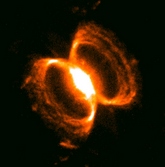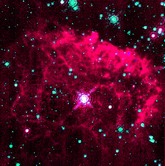The Place of Women in SF
Posted by hyperpat on June 18, 2007
There’s been a fair amount of flap over the scarcity of women authors on the current Hugo nominee list. I think this needs to be looked at with a larger perspective than just the presence or absence of women on such a list, as there has been a long history of reported ‘discrimination’ against women in this field. Such a perspective is offered by Justine Larbalestier’s The Battle of the Sexes in Science Fiction, which I just finished reading. Within this book, she traces the impact and portrayal of women from the earliest days of sf as a separate genre (basically from 1926 onward).
Now clearly, looking at the sf produced in those early days, and continuing up to somewhere around the fifties, there was often (not always, but the exceptions were rare) both an implied and an explicit ‘niche’ that women were supposed to occupy: that of homemaker, baby factory, damsel in distress, love interest, a person that was clueless about science, and definitely not ‘hero’ (or heroine) material. As such, they were not supposed to even be interested in sf, let alone be fans or writers of a field that many rather prominent fans felt was a ‘male only’ area. But regardless of the protestations by some of these folk, in letter columns or some rather snide editorializing, clearly there were female fans, even in the early days. But portrayal of women within the actual stories almost invariably fell into the niche described (or they were left out entirely as not being germane to the story). Stories that actually developed a true romance between the characters were often panned, and female protagonists were almost unheard of (except for a few works that explicitly tried to explore gender boundaries and roles, such as those that posited an all-female world). Some editors also had a definite bias against stories that had such a ‘love interest’, or worse, actively discriminated against women writers. This is not to say that women didn’t write sf in that period. The names of Leigh Brackett, Katherine Maclean, Carol Emshmiller, C.L. Moore, Judith Merril, Zenna Henderson, along with quite a few more, are still known (and respected) today.
But it wasn’t till the late sixties that women authors and more realistic portrayals of women within the stories became a driving force within the field, a period often referred to as the ‘feminist revolution’. Joanna Russ, Ursala K. LeGuin, Anne McCaffrey, Vonda McIntyre and of course James Tiptree, Jr./Alice Sheldon, along with many others, propelled women to prominence, both as recognized authors of great skill and for their portrayal of women within their stories that were not tied down by the patriarchal attitude that had been so prevalent. As evidence of the their new prominence, the Hugo nomination lists for the period of 1968-1980 shows 41 nominations for women out of a total of 245, vs 6 out of 118 for the period of 1959-1967. Since this initial explosion of nominations, the ratio has held fairly steady at about 1/5 of all nominations, though there does seem to be a little fall off recently to about 1/6. Whether this ratio is appropriate obviously depends on just how many women authors there are versus men, a number nobody seems to have a good handle on. But perhaps the greatest marker of this change was an item that Dr. Larbalestier didn’t mention – Andre Norton, who had been writing sf since the mid-thirties (though most of it came after 1948), had almost invariably used male protagonists for her works, but in mid-sixties she switched to using female ones. The very name she wrote under (along with her other names of Andrew North and Allen Weston) is an indication of the prevailing attitude in early sf, choosing a ‘male’ name rather than her given one.
But it should also be noted that sf does not live in a vacuum, but is strongly influenced by the general cultural attitudes in which its authors and fans live. A large amount of all sf has been written by American and British authors, and at least for the period of, say, 1900 to 1960, the American/British culture was strongly patriarchal. This general attitude of considering women to be at best second-class citizens actually has a history stretching back far earlier than this (just note that America’s founding fathers didn’t think women deserved to vote). Women have been discriminated against within the ‘mainstream’ publishing area – I even hear stories today that there are some editors who tell prospective women authors to stick to ‘romance’ stories, that they’re not good enough to write ‘literary’ fiction (regardless of how many examples there are to the contrary).
SF has, for most of its history, been considered by many to be a mainly a ‘guy’ oriented type of literature. Clearly, this is not totally true. SF, as a literature of ideas, often has focused on gadgets, gee-whiz technology, and has sometimes forgotten about the social impact of those gadgets. But the best writers have always considered not just the gadgetry, but what people do and act like in whatever scenario has been envisioned, and this most definitely includes women as active parts of that society. Our society today still doesn’t quite treat women as the equal of men (note the difference in salaries and entrance rates to the corporate boardroom), but neither is it the same society of eighty years ago, where the only proper place for women was as a homemaker. SF stories have, to some degree, recognized that change. Much of the time such stories are written by women, but there are more and more stories that treat women as equal partners in life’s game where you really can’t tell if the author was male or female, and that’s as it should be.
Women authors are getting recognition for their work, though perhaps not quite in the numbers that are totally appropriate. But you’d be hard-pressed to find a SF fan today that would say women don’t belong in the field.



fencer said
Women SF writers are among those I most enjoy, such as Ursula LeGuin or Kate Wilhelm. It is unusual to find a woman writing “hard” SF though…
Regards
hyperpat said
Which is probably one reason why their number of Hugo nominations may be a bit meager this year, as the preference of the fans seems to be the ‘hard’ stuff right now. It is also one of the objections that was raised when the feminist revolution started happening; that the women authors concentrated on the ‘soft’ sciences, that they weren’t writing ‘real’ SF, which, like most arguments of this nature, is quite specious. Good SF can be written about any aspect of the sciences, hard or soft; what counts is how well the story is written, and there is just as much ‘wow!’ factor to be found in the soft sciences as the those ‘hard’ physics texts (for example, look what Octavia Butler has done with biological speculations). And of course, there are women authors who work in the ‘hard’ area, like Nancy Kress and her Probability series.
2008 Hugo Nominations « Hyperpat’s HyperDay said
[…] more flack about this, which I believe is really irrelevant (see my post on the 2007 nominations The Place of Women in SF ). Of far more importance is just what the quality level is of those that are nominated. I’m […]